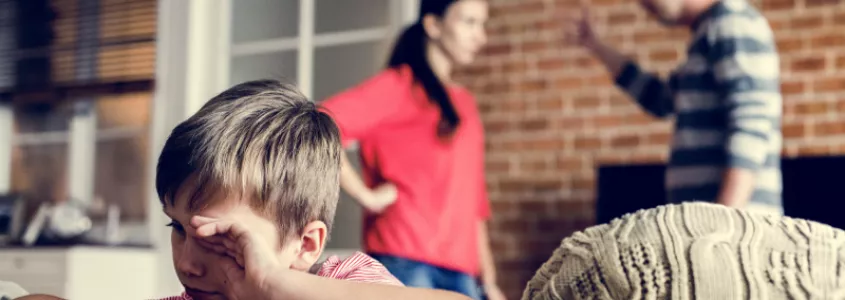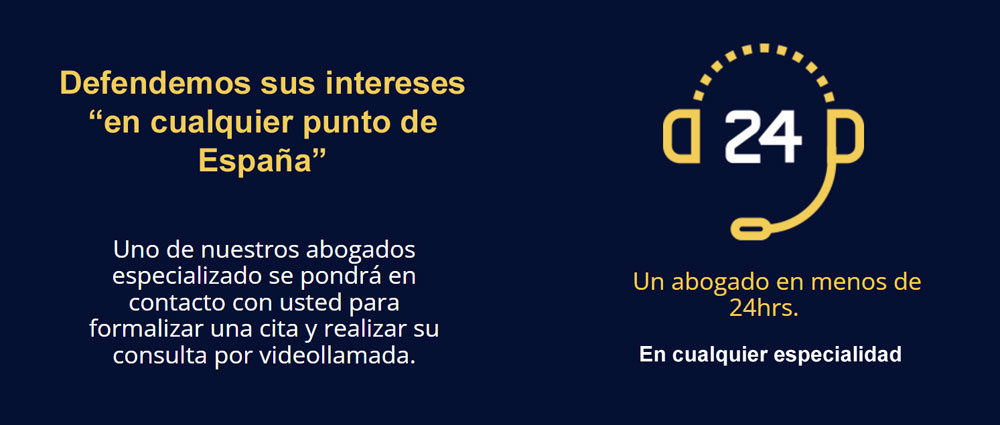
Table of contents
Domestic abuse is an offence under the Penal Code which, unfortunately, has become a scourge in our society. However, there are more and more regulations that try to tackle them. Here we would like to talk to you about them and resolve any doubts you may have about them.o.
The crime of domestic abuse: definition
In order to find the exact definition of ill-treatment in the family environment, we must look at two articles belonging to our Penal Code. The first of these is article 153, which refers to all those individuals who, using any procedure or means, cause injury or psychological harm to another person.
This article of the Penal Code refers to the situation in which the victim is the wife or partner of the offender, whether or not they are cohabiting. It also refers to particularly vulnerable people in their environment and punishes this conduct with sentences of between 6 months and 1 year in prison and between 31 and 80 days of social work. In addition, the offender is prohibited from possessing weapons for a period of between 1 and 3 years.
On the other hand, whenever the court or judge deems it appropriate, the person who commits the offence will be disqualified from exercising parental authority, guardianship, guardianship, foster care or care of their children or other dependents for a period of up to 5 years.
Article 173 of the Penal Code
However, Article 173 of the Criminal Code is even more important than the previous one as far as the crime of domestic abuse is concerned. This is because it refers, in its second section, to domestic violence.
Specifically, Article 173 of the Penal Code gives special protection to certain persons within the family who have been victims of domestic violence. Specifically, these are:
- Spouse, partner or person in an affective relationship with or without cohabitation.
- Children, parents, siblings or siblings of the spouse or partner.
- Minors or adults with disabilities and/or special protection needs.
- Persons subject to guardianship, curatorship, parental authority, guardianship or foster care by the person committing the offence or their partner.
- Any other person within the family nucleus.
When the ill-treatment is exercised on any of these family members, the penalties set out in article 173 PC are:
- Imprisonment: from 6 months to 3 years.
- Disqualification: 1 year to 5 years.
To these penalties should also be added those associated with offences committed through acts of psychological or physical violence. By this we mean that the crime of violence and mistreatment in the family environment is compatible with that of threats or aggression, for example.
In addition, there are a series of aggravating factors that mean that the judge will always impose sentences in the upper half of the sentence.
This occurs when:
- The offence is carried out in the presence of minors.
- Knives or firearms are used to commit the offence.
- It takes place in the victim's home or in the common home of the couple.
- It is carried out in breach of a restraining order or any other precautionary or punitive measure.
Is the offence of domestic abuse prosecutable ex officio?
The answer is yes. This is because it is a public offence and, therefore, the public prosecutor, as specified in article 104 of the Criminal Procedure Act, can proceed ex officio if he/she deems it appropriate.
How should a victim of domestic violence act?
Any person who has been a victim of this type of crime should act as follows:
- Go to any medical centre if you have been physically assaulted in order to receive a diagnosis, have your injuries treated and obtain an injury report. On notifying the medical body of the reason, they will immediately send it to the Guardia Civil or the National Police and to the Duty Court. The possible psychological damage suffered, if any, must be included in the report.
- Go to the Duty Court, the Police Station or the nearest Civil Guard Station to file a complaint for ill-treatment within the family environment.
The victim should be aware that there are various specific units for help and advice for people in the same situation. This is the case of the Women's Services (SAM) of the Directorate General of the National Police, the Women and Minors Teams (EMUMES) of the Civil Guard and the Services for Victims of Domestic Violence (SAVD) of the different units of the Municipal Police.
What happens when it is the children who commit the crime of domestic violence against their parents?
Violence by children against their parents, whether physical or psychological, is also considered as domestic violence and is typified in the Penal Code in article 173.2. However, it has certain specificities.
Once an injury report has been obtained and the relevant complaint has been filed, the victim has the right to obtain protection according to the provisions of article 544 of the Criminal Procedure Act. Furthermore, on the basis of article 795.1.2.2 of the same legal text, the procedure can be initiated by means of a speedy trial.
One of the most common measures is to file a restraining order. This generally entails the abandonment of the child's family home. When the child lacks support, the situation can become a real problem for which the administration must act to ensure a livelihood outside his or her family environment.
It should be noted that this is one of the few cases in which the victim's forgiveness and her decision to resume cohabitation with her aggressor (the son) extinguishes the court-imposed restraining order. This is reflected in the Supreme Court Judgement of 26 September 2005.
Can child abuse be domestic violence?
Yes, but, as mentioned above, the crime of domestic violence is compatible with any other crime, and therefore carries additional penalties. Specifically, current legislation considers the following offences to be offences of domestic abuse when they are committed against children or other minors in the common home or when they are committed by the spouse:
- Sexual abuse.
- Sexual assault and rape.
- Clitoral ablation.
- Sexual provocation.
- Child prostitution.
- Corruption of minors.
- Sexual exploitation of children.
In recent years, the Penal Code has been adapted to cover the variants of these offences carried out by cybernetic means, i.e. via the Internet. Specifically, these variants are typified in Articles 178, 183 and 189 of the Penal Code. In fact, the law also establishes as an aggravating circumstance the approach to the commission of these crimes that involves intimidation, deception or coercion.

"Anywhere in Spain"
With our online appointment system you will have immediate advice without the need for face-to-face visits or travel.
One of our lawyers specialized in your area of interest will contact you to formalize an appointment and make your consultation by video call.


Add new comment